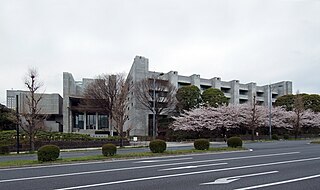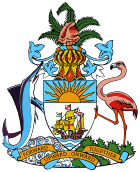
The Australian Electoral Commission (AEC) is the independent federal agency in charge of organising, conducting and supervising federal elections, by-elections and referendums.

The Court of Appeals of Maryland is the supreme court of the U.S. state of Maryland. The court, which is composed of one chief judge and six associate judges, meets in the Robert C. Murphy Courts of Appeal Building in the state capital, Annapolis. The term of the Court begins the second Monday of September. The Court is unique among American courts in that the judges wear red robes. The Maryland Court of Appeals joins the New York Court of Appeals in being the only two state highest courts to bear the name "Court of Appeals" rather than "Supreme Court".

Elections in Botswana take place within the framework of a multi-party democracy and a parliamentary system. The National Assembly is mostly directly elected, and in turn elects the President and some of its own members. The Ntlo ya Dikgosi is a mixture of appointed, hereditary and indirectly elected members.
India is a federation with a parliamentary system governed under the Constitution of India, which defines the power distribution between the union, or central, government and the states.

Philippine elections are of several types. The president, vice-president, and the senators are elected for a six-year term, while the members of the House of Representatives, governors, vice-governors, members of the Sangguniang Panlalawigan, mayors, vice-mayors, members of the Sangguniang Panlungsod/members of the Sangguniang Bayan, barangay officials, and the members of the Sangguniang Kabataan are elected to serve for a three-year term.

Elections in Lithuania gives information on elections and election results in Lithuania.

The Commission on Elections, usually abbreviated as COMELEC, is one of the three constitutional commissions of the Philippines. Its principal role is to enforce all laws and regulations relative to the conduct of elections in the Philippines.
The Edmonton provincial electoral district existed in two incarnations from 1905 - 1909 and again from 1921 - 1955, with the city broken up into multiple constituencies in the other time-periods. The district was created when Alberta became a province, to encompass residents of the city of Edmonton on the northside of the North Saskatchewan River For a time, it was one of three multi-member constituencies in the province's history, the others being Calgary and Medicine Hat.

The Supreme Court of Japan, located in Hayabusachō, Chiyoda, Tokyo, is the highest court in Japan. It has ultimate judicial authority to interpret the Japanese constitution and decide questions of national law. It has the power of judicial review; that is, it can declare Acts of the National Diet, local assemblies, and administrative actions, to be unconstitutional.
The Tennessee Plan is a system used to appoint and elect appellate court judges in Tennessee. The system required candidates be selected by a nominating commission and therefore plays a significant role in the selection of the state's judiciary. It is largely patterned after the Missouri Plan, and an earlier version in Tennessee was called the Modified Missouri Plan.
Referendums concerning the independence of judges and four-year parliamentary terms were put to New South Wales voters on 25 March 1995. The referendums coincided with that year's New South Wales general election. Both changes had the support of the major political parties and were approved by large majorities.

Zimbabwe Electoral Commission (ZEC) is a nominally independent organisation which controls elections at all levels of Zimbabwe politics. It was established by an Act of the Parliament in 2004, with influence from its predecessor, the Electoral Supervisory Commission as well as the Southern African Development Community.
This page lists nationwide public opinion polls that were conducted relating to the 2012 United States presidential election between Democratic Incumbent President Barack Obama, Republican Mitt Romney, as well as other third-party and independent challengers.
Some type of election in Connecticut occurs annually in each of the state’s cities and towns, the exact type of which is dependent on the year. Elections for federal and statewide offices occur in even-numbered years, while municipal elections occur in odd-numbered ones.

A constitutional referendum regarding the Prince’s powers was held in Liechtenstein on 14 March 2003. The referendum had two questions; a "Princely Initiative" and a "Constitution Peace Initiative". The first question passed with 64.32% in favour and the second question was rejected by 83.44% of voters.

The Ukrainian sovereignty referendum was conducted on March 17, 1991, as part of the first and only Soviet Union referendum. Throughout the Ukrainian Soviet Socialist Republic, voters were asked two questions, with an additional question attached to the ballot in the historical region of Galicia which includes the Ukrainian provinces of Ivano-Frankivsk, Lviv, and Ternopil.
The 2010 Virginia State Elections took place on Election Day, November 2, 2010, the same day as the U.S. House elections in the state. The only statewide elections on the ballot were three constitutional referendums to amend the Virginia State Constitution. Because Virginia state elections are held on off-years, no statewide officers or state legislative elections were held. All referendums were referred to the voters by the Virginia General Assembly.
The 1998 Virginia State Elections took place on Election Day, November 3, 1998, the same day as the U.S. House elections in the state. The only statewide elections on the ballot were five constitutional referendums to amend the Virginia State Constitution. Because Virginia state elections are held on off-years, no statewide officers or state legislative elections were held. All referendums were referred to the voters by the Virginia General Assembly.
A constitutional referendum was planned to be held in Tanzania on 30 April 2015. However, delays to voter registration led to it being postponed.

Philadelphia's municipal election of November 7, 1961, involved the election of the district attorney, city controller, and several judgeships. Democrats swept all of the city races but saw their vote totals much reduced from those of four years earlier, owing to a growing graft scandal in city government. District Attorney James C. Crumlish, Jr. and City Controller Alexander Hemphill, both incumbents, were returned to office. Several ballot questions were also approved, including one permitting limited sales of alcohol on Sundays.











